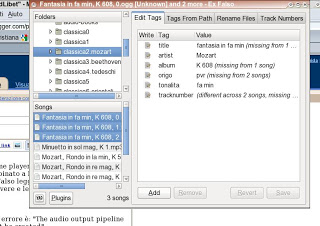An excellent audio player is Clementine (and its fork Strawberry), which can do a lot of things. Its graphical intercace is very intuitive and complete.
But quite good is also QuodLibet: very fast (with a spartan graphical interface, not really intuitive) but highly customizable (i.g. you can create, edit and view new type of audio tags, or create bookmarks within an audio file). In my (personal) opinion it can integrate, but not replace Clementine. Indeed Quodlibet has some serious limitations, such as crashing, if you add some plugins, or it is not able to browse your disk (the only navigation is through tags, not through files).
Audacious is a very light solution, a good one if you don’t have too many audio files and you don’t need to have multiple options.


![[Image]](https://localhost/web/culturanuova/wordpress/wp-content/uploads/2010/02/ex-falsotagger.jpg)